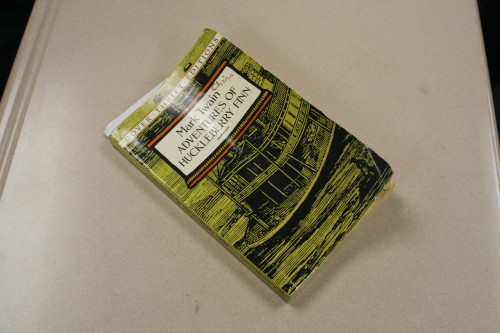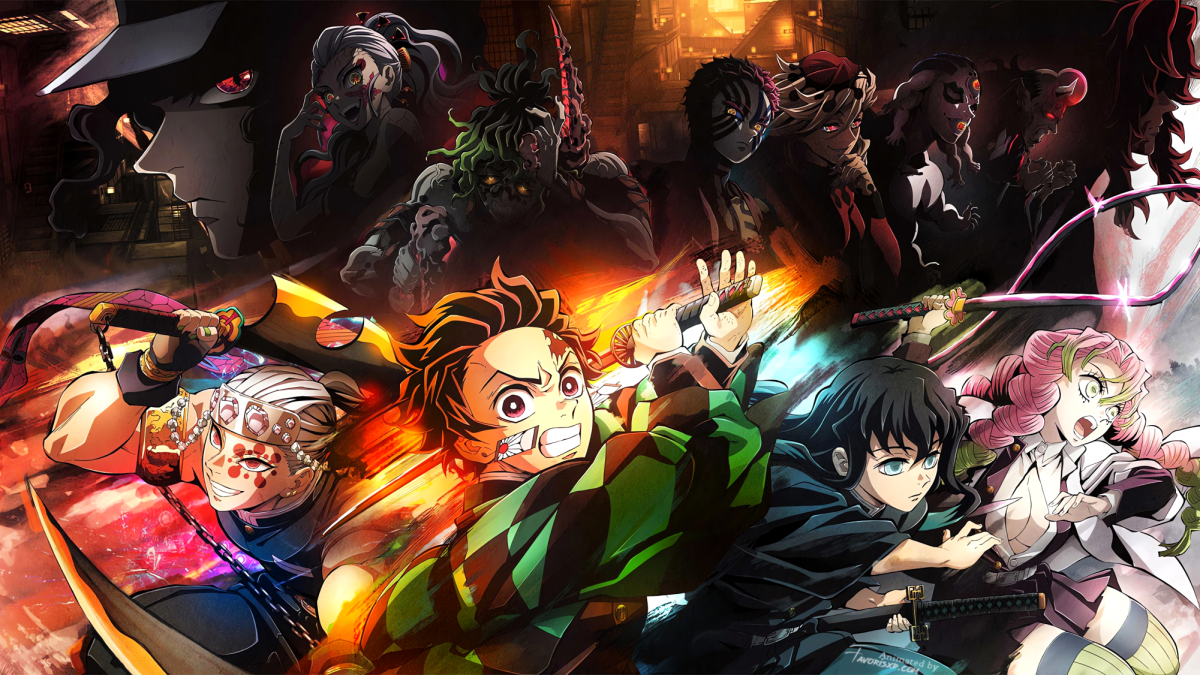
By AKANKSHA SAH
Staff Writer
This article is a response to the article, “The MisAdventures of Huckleberry Finn,” written by Aishee Das.
The Adventures of Huckleberry Finn, told through the voice of a thirteen year-old boy living in Antebellum (pre-Civil War) America, is a classic full of rugged Western landscapes, adventures with friends and unlikely heroes. However, the lighthearted tone of those aspects of the novel only serves to underscore the much darker themes and messages throughout the novel. Mark Twain’s bitingly witty social criticism and messages about morality, justice and equality make the novel an integral part of the high school curriculum throughout the country.
Set in a time during which slavery was one of the biggest issues in the country – one that, in fact, started a war – The Adventures of Huckleberry Finn could not have been written without any mention of the terrible institution. Conversely, with Twain’s purpose of social criticism, the mention of slavery is actually essential to the novel’s integral plot, message and purpose. In portraying the South as accurately as he could, Twain included racist characters with discriminatory beliefs and hurtful language, the most controversial of which being the n-word. Unfortunately, many modern readers have missed the novel’s point and wrongfully believe that the novel, which portrays racism, must have been written by a racist and must teach racism to readers. These people could not be farther from the truth and, sadly, have missed out on the true experience of reading the great classic.
To defend the claim that the novel has a racist point of view, some point to the fact that the narrator, Huckleberry Finn, is white. While it is true that a black narrator could have accurately shown the inner workings of his or her mind in a completely unbiased way, this fact certainly does not imply that having a white narrator makes the portrayal racist. By that logic, having a male narrator makes the novel sexist or having a young narrator makes the novel discriminatory towards old people. Huckleberry’s race does not make the novel racist. Quite to the contrary, Huckleberry’s race, class and age are what allow Twain to be so powerfully anti-racist.
Just as people are not born knowing calculus or physics, people are not born racist. Racism – discrimination against a certain group of people based on race alone – is a learned behavior. In America’s Antebellum South, white children were often raised by African American slave women, spending more time with these mother figures than with their actual parents. Without society to teach them otherwise, these children would have grown up loving these women like any other nannies or adopted parents, but instead, with society’s influence, most Southern children grew up to be just as racist as their parents.
Twain creates his character, Huckleberry, and plucks him out of society at age thirteen – before he has been taught to be one of those racist white men. By the start of the novel, Huckleberry has already had many racist influences throughout his young life, from his drunkard father to his slave-owning guardian. Each person who tries to “civilize” him, however, fails to fully achieve his or her goal. Because people have tried but failed to fully integrate him into their society and its norms, Huckleberry retains just enough racism for Twain to reveal to readers the mindset of the South, while still showing the world through an unbiased lens and an open mind, revealing to readers the irreconcilable discrepancies between Southern society and Southern reality.
Twain uses his naïve narrator, Huckleberry, to reveal society’s warped views as clearly as possible. Not only is Huckleberry young but he is also a very humble, easily influenced boy. Because of his trusting, self-deprecating nature, he believes most things people tell him, and what he thinks of when reflecting on the lessons he learns shows readers what the society of his time valued.
One example of a time when Huckleberry reflects on society is when he and Jim, the runaway slave he is helping, are nearing the place where Jim will officially get his freedom. Jim starts speaking of how he will save up money and free his family when he gets his freedom. Huckleberry hears this plan and thinks to himself, “it was according to the old saying, ‘Give a (n-word) an inch and he’ll take an ell.’” Huckleberry only thinks of this because he has been forced to learn it at some point, but society is the one that believes in it and taught it to him.
In the eyes of the Southern society of the time, an African American man trying to be with his family was ungrateful for what had been given to him and was trying to take more than he deserved from the world. By using Huckleberry as the tool to convey this ideology to readers, Twain makes the saying not only clear, but all the more distasteful, coming from a young, innocent child.
Throughout the novel, Huckleberry also reflects on how “bad” he is for not letting people teach him their society’s ways. At one point, he thinks of the Sunday school in his hometown and tells himself that at that school “they’d a learnt you, there, that people that acts as I’d been acting about that (n-word) goes to everlasting fire.” By using a young boy to convey this Southern idea about what is considered a sin, Twain was able to criticize the idea without even commenting on it – it is just so blatantly a ridiculous notion to think that a young boy helping a kind man to freedom would go the “everlasting fire” for it.
Everything down to the very word Huckleberry calls African Americans, another learned thing, is racist. To modern, 21st century audiences, the ideas that Huckleberry had learned would be disgusting coming from anyone – young or old – but Twain actually wrote The Adventures of Huckleberry Finn not long after the Civil War, a time when racism was still rampant throughout all of the United States, especially the South.
Had Huckleberry’s thoughts come from a fully grown Southern man who had already been indoctrinated with the ideas, readers may have been able to assume Twain agreed with them and racism. The clear difference between Huckleberry’s actions, even going to the extreme of helping free a runaway slave, and society’s beliefs, however, set audiences firmly in favor of Huckleberry, the protagonist. Without Huckleberry’s white middle class status, Twain would not have been able to portray society’s beliefs through him because society only taught them to others from their class and race. Through its racism, society, the novel’s overarching antagonist, actually helps Twain convey his powerful anti-racist message.
While Huckleberry’s thoughts are sometimes clouded by society’s influence, his young mind is still untainted in many aspects of life, allowing him to see things the way they are. One instance of this is when Jim thinks fondly of his wife and children, and Huckleberry observes, “I do believe he cared just as much for his people as white folks does for ther’n. It don’t seem natural, but I reckon it’s so.” The contradiction between society’s view that his love is “unnatural,” which Huckleberry has been taught at some point in his life, and his actual observation of Jim’s true love for his family is clear. Because Huckleberry is only a boy, he is able to see this difference and put more belief in his own observation of reality than in society’s ideas.
Similarly, when the two of them escape from a life-threatening experience, Huckleberry remarks, “[Jim] was right; he was most always right; he had an uncommon level head, for a (n-word).” Once again, Huckleberry sees something in reality, compares it to the South’s ideas about blacks and comes to a conclusion that supports his experience. A fully grown racist man might have chalked Jim’s intelligent observations up to luck or said it was just common sense, but Huckleberry sees the facts as they are.
Why, then, did Twain allow his character to see the unbiased realities in his experiences? More importantly, why did Twain even create moments that could be interpreted as Huckleberry does in the first place? If Twain were a racist, he would not have created Jim’s tender family recollections or shrewd observations. The only reason he included any of the countless similar moments in his novel is that he despised slavery and racism. Twain included racist sayings to show the ridiculousness of them – not to agree with them. His protagonist’s sole purpose throughout the book is to illustrate the flaws in society’s beliefs.
It is true that Huckleberry Finn, a young boy, changes throughout the novel; it is true that Jim does not. It is true that Huckleberry has complex contradictions in his thoughts; it is true that, if Jim does, we as readers do not see them. However, these discrepancies between characters do not, in any way, make one character less important than the other. Jim is not a static character because he has been stereotyped. Quite to the contrary, he is a static character because he so goes against the stereotypes from the time. Jim is so highly evolved a person that he has no more changes to make – he is perfect as he is.
On the other hand, Huckleberry has been negatively influenced in his past, and the novel, a bildungsroman (coming of age story), illustrates his evolution into a boy with his own moral compass. Huckleberry changes not because he is better than Jim but because he is less of a person. Huckleberry starts out as a racist and has to grow into less of a racist, and thus, his change is not from good to better but from bad to less bad. His complex thoughts are a result of his negative influences. His thoughts are contradictions not because he has more intellectual capability than Jim but because half of all of his thoughts are just plain wrong.
Readers have to come to this conclusion about the novel themselves by reading between the lines of the novel. If they understand just the literal meanings of things and take the novel at face value, it is easy to misinterpret all of the messages. Even if one completely misses all of Twain’s points throughout the work, however, it is still completely ridiculous to proclaim that Twain himself was racist. In his Autobiography of Mark Twain, he wrote the following about a childhood friend:
“We had a faithful and affectionate good friend, ally and adviser in “Uncle Dan’l,” a middle-aged slave whose head was the best one in the negro quarter, whose sympathies were wide and warm and whose heart was honest and simple and knew no guile…I have not seen him for more than half a century, and yet spiritually I have had his welcome company a good part of that time and have staged him in books under his own name and as “Jim”, and carted him all around—to Hannibal, down the Mississippi on a raft and even across the Desert of Sahara in a balloon—and he has endured it all with the friendliness and loyalty which were his birthright.”
What does this quote mean? It means that the very notion of Twain being racist has been shot down. It means that Mark Twain himself, in his own words, has come out and stated that not only is Jim a protagonist in his novel but he is also based on a real human being whom he respected and considered a loyal and undying friend in life.
Taking the true meaning of the novel and Twain’s just mission in life into account, it is easy to see why The Adventures of Huckleberry Finn is considered a great American classic. It is easy to see why high schools across our country feel that this novel is a worthy addition to the curriculum. While some editions of the novel that replace the n-word with a less emotionally charged word have come out, these editions take away from the true significance of the novel. The word, in all of its tragic history, represents the feeling of the era and is an essential tool that Twain uses to recreate the Southern views of the time. While some unlucky readers have missed out on the intended experience of reading so complex a novel, others have been lucky enough to experience it in all its glory. While there will always be people who misinterpret the novel, high schools have been prudent enough to maintain its status in the curriculum, allowing each student an opportunity to interpret it him or herself. Readers may choose to take this opportunity and run with it or to turn it down, but at least high schools give them a chance.















Dan Evenstein • Feb 27, 2016 at 7:18 pm
Fantastic article – really offered some great original insight into the novel. Analysis of the relationship between Huck and society was very mature. The quote from Twain himself really put things into perspective. Bravo.
A Person • Mar 3, 2015 at 6:01 pm
LOL, overkill much? This article has great points, and all are effectively stated and upheld with great evidence. I feel bad for this Aishee girl.